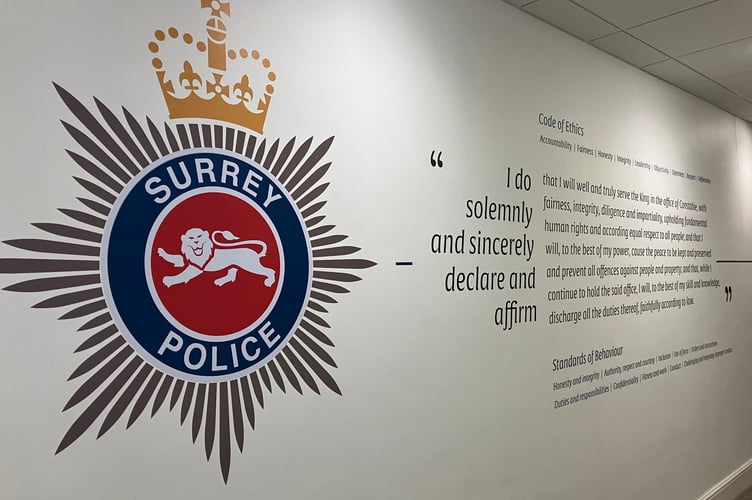Amy Levy, 22, deliberately took an overdose of her prescription pills at her student home in Bristol while on the phone to a friend on June 18, 2023. Her friend alerted the police as Amy’s condition worsened.
Surrey Police and Avon and Somerset Police launched an urgent search to find the University of the West of England (UWE) student and tried to contact her parents, who live in Surrey, because they did not know her address.
But when officers and staff tried to reach Amy’s parents, no one picked up the phone to the number showing ‘no caller ID’. The calls were left unanswered, unable to ring back and no voicemail was left despite the gravity of the situation.
Amy was eventually located more than 90 minutes after the first police call. Sadly, she died in hospital on June 22, 2023 from an overdose of different medications which caused hypoxic brain injury.
In a statement, Amy’s parents said: “We are totally broken that Amy is no longer with us, but we are also so proud of Amy and grateful for the time we had her in our lives.”
An inquest jury identified a “catalogue of missed opportunities” to save Amy. The five-day inquest from June 6, 2025 concluded if the police had found her sooner, she would have survived. The jury said that despite taking a deliberate overdose of prescription drugs, it was not possible to know her true intent.
Robert Sowersby, Assistant Coroner for Avon, has now issued a report raising concern about the lack of guidance or training issued to officers and staff about leaving voicemail messages – especially in circumstances where they are trying to obtain important information in a time-pressured situation.
He said it was “hard to understand” why all of the officers or police staff decided not to leave any voicemail or message despite both forces grading Amy’s case as requiring an “immediate” response, the most urgent category.
“Both police forces knew that Amy had taken an overdose at an unknown address and that her condition was deteriorating,” the report said.
“Despite that factual background, none of the officers or call handlers who phoned Amy’s parents left a voicemail message.”
The inquest found that because the missed calls were from an unknown number, Amy’s parents did not know that there was an emergency, or that the police wanted to speak with them, and had no way of calling them back.
Assistant coroner Sowersby wrote: “It is probable that Amy’s location could have been obtained earlier than it was if the police had left a suitably worded voicemail for one or more of her parents.”
Surrey Police attended the family home in person and received details of Amy’s current address, which led to officers being able to find her in Bristol, Avon and Somerset Police said.
Police inspectors from both forces gave evidence at the inquest. There was guidance in Avon not to leave voicemails when the incident in question concerns domestic abuse, but there is no general guidance about when to leave a voicemail message in other cases. Surrey Police provided the coroner with evidence of updated voicemail procedure indicating that callers must consider if it is appropriate to leave a voicemail or message.
Mr Sowersby said: “With limited or no guidance, training or policy on when police and/or police support staff liaising with the public should leave a voicemail, particularly in circumstances where they are trying to obtain important information in a time-pressured situation, I am concerned that there is a risk that future deaths will occur unless action is taken.”
Iftikhar Manzoor, of Hudgell Solicitors, represented Amy’s parents at the Inquest and said her death ‘must lead to clear policies’ across UK police forces when the risk to an individual has been graded as the highest level of urgency.
He said: “What has been truly shocking to learn has been the fact that there is no system in place with regard to leaving messages in a situation where somebody’s life is quite clearly at risk, and the only person posing a danger to them is themselves.
“The calls were shown as unknown numbers, and as the police chose not to leave messages and only made one call attempt, a huge opportunity was lost immediately, and the sense of urgency dropped. It was the bare minimum effort.”
Responding to the coroner’s report, Superintendent Chris Colley of Surrey Police said: “Our thoughts and condolences remain with Amy’s friends and family following what must have been a very hard couple of years for her loved ones.’
He added: “We have now made changes to our procedure around the use of voicemails and telephone contact attempts, to ensure we are doing all we can to be there for people when they need us most.”
A spokesman for Avon and Somerset Police said: “Our thoughts are with the family of Amy Levy, who died in extremely tragic circumstances two years ago.
“A private apology has been made to her family, which we wish to repeat publicly, and we are reviewing our organisational policies in line with the findings relating to this case.”
Avon and Somerset Police also said they are looking at potential changes to force polices as guided by an Independent Office for Police Conduct (IOPC) learning recommendation earlier this month. The spokesperson said: “We will ensure any necessary changes to help protect the public are adopted and will provide a further update to the IOPC and coroner in due course.”





Comments
This article has no comments yet. Be the first to leave a comment.